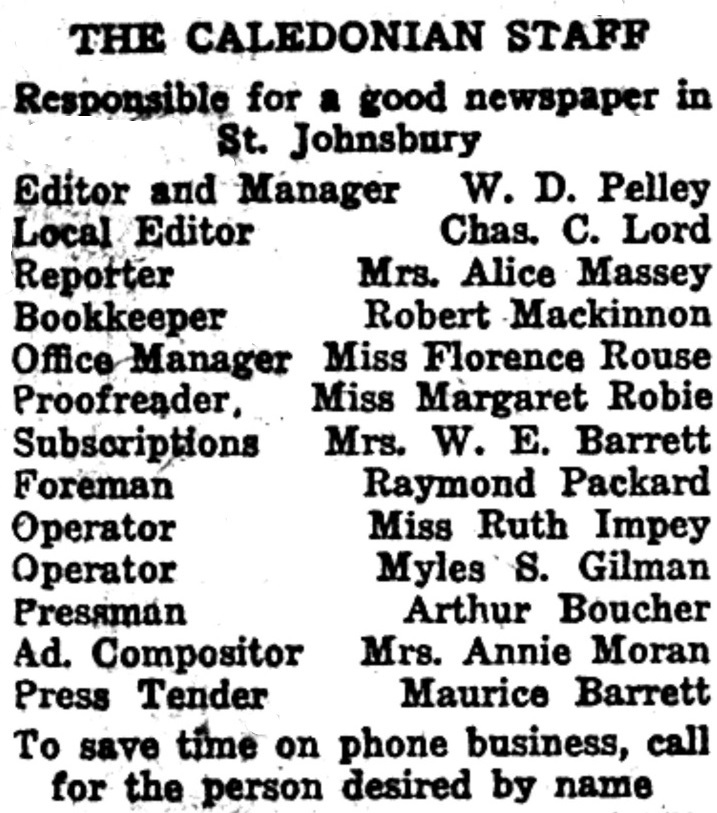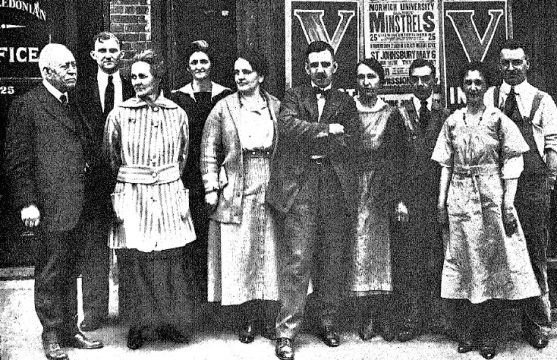In the spring of 1919, William Dudley Pelley, the owner and editor of St. Johnsbury’s Evening Caledonian, took the unusual step of listing all of the paper’s staff on the masthead, under the heading “Responsible for a good newspaper in St. Johnsbury.”
 Pelley was a successful short story writer, and we learn more about the Caledonian staff from one of his stories that appeared in the November 1919 issue of American Magazine. A photograph of the Caledonian staff accompanies “Human Nature–As the Country Editor Knows It.” Pelley provided a lengthy caption that describes what he saw as the duties and talents of the five women and five men standing in front of the paper’s office on Eastern Avenue.
Pelley was a successful short story writer, and we learn more about the Caledonian staff from one of his stories that appeared in the November 1919 issue of American Magazine. A photograph of the Caledonian staff accompanies “Human Nature–As the Country Editor Knows It.” Pelley provided a lengthy caption that describes what he saw as the duties and talents of the five women and five men standing in front of the paper’s office on Eastern Avenue.
 From left to right, some highlights from Pelley’s caption:
From left to right, some highlights from Pelley’s caption:
- Robert MacKinnon, “who keeps the creditors sweet” and “sees that the books show a profit.”
- Miles S. Gilman, “who joshes the typesetting machines into getting out the news.”
- Mrs. Alice Massey, “our little lady reporter, who knows everybody in town and everything that happens in the community.”
- Miss Margaret Robie, “society editor, proof reader, and trouble-fixer.”
- Miss Florence Rouse, “the girl who is never in a hurry, but does more work than all the rest of the office put together” and “general all-around assistant to the Boss.
- The Boss (Pelley).
- Miss Ruth Impey, “who operates another one of the typesetting machines” and “whose proof is as pure as a baby’s smile.”
- Arthur Boucher, who “sees that the paper is printed on the big Duplex in such shape that the town can read it without having to go and wash its fingers afterward.”
- Mrs. A.M. Moran, “who never took a back seat when it came to setting ads that made the lives of the local merchants a pleasure and a joy.”
- Ray Packard, “the man who bosses the whole push.”
They were, Pelley concluded, “a happy bunch who never speak a cross word to one another.”
Issues of the weekly Caledonian from 1837 to 1884 are available now on Chronicling America, and more years of the weekly and the daily Evening Caledonian will be added soon.

You will be interested to know that William Dudley Pelley was in Bennington
in the years 1915-17 and worked not as a writer for the Bennington Banner
but in the composing room. He reportedly labored evenings over a rented
typewriter cranking out some of the many of his novels. Pelley later became
known nationally as leader of the fascist “Silver Shirts” who admired
Hitler, imitated Hitler’s appearance, and some thought he aspired to
succeed him. Pelley founded the Silver Shirts in 1933 and set up
headquarters in Asheville, N.C.
According to Samuel Eliot Morrison’s Oxford History of the American People
(1965, p. 970-1) Pelley regarded Hitler as a new god, published his The
Coming of American Fascism in 1936, and called his Silver Shirts “the
flower of our Protestant Christian Manhood.” Morrison calls them ” . . .
middle-class hoodlums, who imitated Hitler’s storm troopers by terrorizing
Jews, communists, and liberals, but with minimum success. Pelley counted on
becoming the American Fuhrer when Hitler took over, and his lieutenants
picked out expensive mansions from Newport to Palm Beach for future
headquarters as Gauleiter.”
The Bennington Banner published several columns about Pelley in 2001
written by Joseph Parks.
Tyler Resch, Bennington Museum